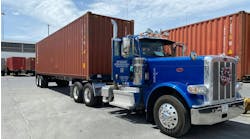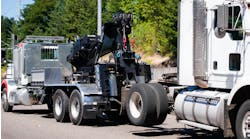LOUISVILLE—A federal committee and the public are looking critically at the fairness of lease-purchase agreements.
The Federal Motor Carrier Safety Administration held its fourth Truck Leasing Task Force meeting here at the Mid-America Trucking Show. The Task Force discussed solutions to exploitative lease-purchase agreements and listened to public testimonies.
“We regulate any aspects of the trucking industry, including drivers, but it is critical to us that we do what we can to help experienced drivers thrive in this industry,” said Brian Stansbury, FMCSA chief counsel and member of the Task Force. “Because the more experienced drivers we keep on the road, the safer the roads will be.”
“Done properly, truck leasing can open the door to prosperity,” said Stansbury. “It can give somebody the ability to start driving to earn a living, support their family, and start building their piece of the American dream. But we have seen too many examples where that is not the case, too—many examples where there is predatory behavior, confusing contracts, sometimes outright duplicitous behavior that can lead drivers underwater, in conditions where they are not able to keep their trucks up to a safe state.”
Often, a driver under a lease-purchase contract can only use repair facilities approved by the carrier—often the carrier’s repair facility. The carrier can come up with any price for the repairs and deduct its cost from the driver’s compensation. Drivers can receive a check for $0 or even a negative amount of money.
“Why can these drivers not lease trucks from traditional leasing companies?" Paul Cullen, attorney of Cullen Law Firm and member of the Task Force, asked. “The standards of those lending organizations don’t reach those individuals who are typically caught up in these truck leasing programs. So, how can carriers provide leases to drivers that traditional lending companies cannot? The reason is that they have control over those drivers. They control their work, their compensation.”
The result is a system that can exploit and discard drivers at a rapid rate. A driver signs a lease-purchase agreement, works for a few months until they cannot make enough money to cover the contract’s payments, and then exits the industry. The leaseholder can then re-lease the same vehicle with a new driver.
“I can count on one hand how many people that I know completed the lease and own that truck,” Steve Rush, chair of the Task Force and founder of Carbon Express, said. “[Drivers] love to do what they do, and people take advantage of that. It borders, in my opinion, on criminal.”
Public testimonies on lease purchase agreements
The meeting held two public comment periods, where meeting attendees had two minutes or more to share their experiences or opinions on lease-purchase agreements.
Some thought that the implied power imbalance of lease-purchasing was not the issue.
“I don’t see that being a problem because, regardless of who holds the debt, somebody is going to own the debt,” Steve Harlow, a truck driver for 27 years, said during the public comment period. “It’s really hard to determine who’s right and who’s wrong because it’s so complicated. I’ve been very successful with my lease purchase.”
However, many attendees noted that people exiting the industry after a bad lease purchase were not around to share their experiences. Moreover, it would be difficult for the Task Force to find and count the number of poor lease-purchase experiences.
“We don’t really know how many didn’t make it because you probably can’t contact them; they’ve gone out of business,” Tom Wekley, who started in trucking in the early 60s, said. “Whenever people say ‘this many failed’ they may be underestimating by a tremendous amount, so you need to keep that in mind.”
Other commenters had suffered through poor lease-purchase agreements but managed to remain in the industry.
“I have been in nine different lease purchase programs with nine different companies. Out of those nine, in two companies I actually built equity and became successful as an owner-operator,” Clifford Petersen, a driver and PhD student who has been in the industry for 25 years, said. “Out of the other seven, the practices are pretty regular: They have short miles, so the drivers don’t do anything to pay off their truck debts and can’t take home a paycheck ... they turn around and overcharge you for maintenance and things like that, because you have to get it fixed where they want to get it fixed, instead of where you want to get it fixed. Even a simple oil change: I’ve seen $900 for an oil change. It’s ridiculous.”
“One of the panelists said that it borderlines criminal; it is criminal,” Petersen said. “What they do is criminal, and they need to be prosecuted for it. They know if you go through these programs, you can’t afford a lawyer”
Possible solutions
The Task Force also considered different solutions to the problem of lease-purchase agreements. Some thought that the best option is to prohibit the power imbalance directly.
“The one concept I’d like to keep on the table for our discussions and our recommendations is the idea that no motor carriers should own the debt of a driver,” said Cullen. “They have supreme control over the driver, and this goes into controlling the driver’s finances, how they operate on the road, whether they drive when they are tired.”
Kaitlyn Long, assistant director of strategic initiatives and chief economist at International Brotherhood of Teamsters and member of the Task Force, suggested a system where carriers pay leased drivers through two separate systems.
“Something that we think is really helpful to this relationship between a driver/owner-operator and the company they’re operating for is the idea of having two checks paid for their time,” said Long. “One check pays them for their physical time as a person working, and then another check that pays for the lease.”
Jim Jefferson, supervisor of regulatory, compliance, and OCC at the Owner-Operator Independent Drivers Association and member of the Task Force, thought that carriers should not be able to control where the lessee’s equipment goes.
“One of the things that needs to be in place for the program: The driver has to have the ability to control where the truck goes, so they can control how much money it makes,” said Jefferson. “So long as the carriers can control that, the guy in the truck is at their mercy. You make them mad, and they can drop your loads. Now you can’t pay your bills, you’re in default, they take the truck back, and you have to start over.”
Task Force members also sought feedback from public commenters for their thoughts on solutions to the problem.
“Definitely regulated and overhauled. Getting rid of? No, because it is an avenue for young guys to come into the industry,” said Petersen. “It’s a good opportunity to become an owner-operator, but you have to be disciplined, you have to learn some business, and you have to learn to rebuild your credit.”







